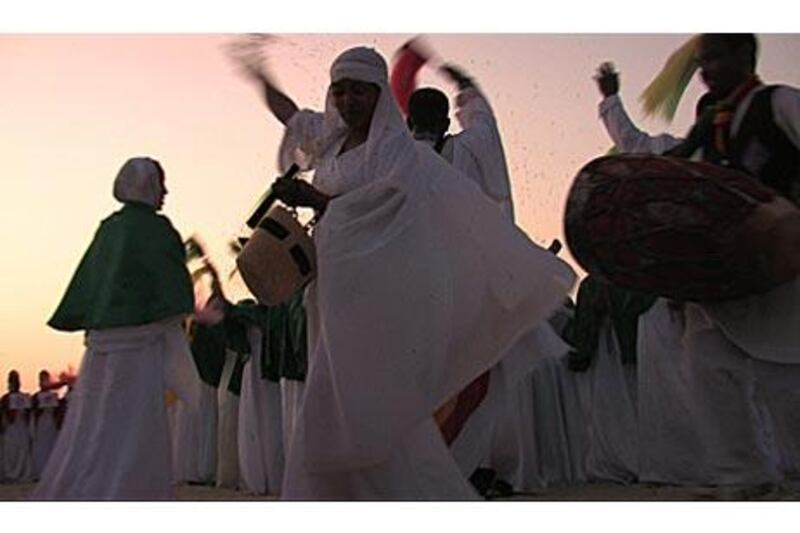Arriving at the Meskel celebration in Sharjah was much easier last year. I followed some Ethiopian friends in my car as they picked up people along the way and eventually we ended up on the beach where the annual festivities are held without me having to know the way. This year I woke up late. Now it's 4pm and we're bouncing back and forth across traffic on Sheikh Zayed Road like a cannonball ricocheting through a canyon. My Ethiopian friends have left ahead of me. The directions I have from them are of the over-the-river-and-through-the-woods variety. One of my two non-Ethiopian companions in the car is in the passenger seat trying to translate this half-cocked course into roads on the map. The ceremony culminates at dusk and we're racing against the sun.
According to traditions in the Ethiopian Orthodox Church the holiday owes its origin to the fourth century when the whereabouts of the cross of Jesus' crucifixion were revealed to the Byzantine Queen Eleni in a dream. In the vision she was instructed to make a bonfire. When the search party did so the following day a great plume of smoke rose from the pyre and travelled across the sky to the hill where the relic was buried.
These days, every year in Ethiopia's capital of Addis Ababa tens of thousands of people gather in the main plaza on the eve of September 27 to re-enact the event. For more than a decade, a similar rite has taken place in Sharjah on the preceding Friday. The problem is I don't know where. My general plan is to drive along the waterfront and look for 4,000 or so Ethiopians standing around a towering flame.
By 5.30pm, with the sky washed in orange, we turn off of Emirates Road near Al Mamzer Beach, which is our best guess of where to go. Alas, no smoke; no Ethiopians. Now, it's scramble time. We whirl around a series of roundabouts and keep the Arabian Gulf to our left with an eye to the sky. Somewhere near the Chamber of Commerce we spot three cars stalled on the road with their hazard lights blinking. The African families piled inside look almost as lost as we do. I jump out and extend my right arm with my left hand gripping my right biceps to shake hands in an Ethiopian gesture of respect.
"Meskel?" I ask. A few phone calls later we all zoom off together like a fleeing caravan. We make up for lost time until a wrong turn lands us gridlocked in traffic on the Al Arouba Street bridge. I've done a fair bit of travelling in what used to be called the Third World. I always admire the way people in many places can drive with disregard for vehicle, passenger or pedestrian - like the flow of rushing water filling in empty space. I adopt the mania of this mad, mad motor world and take over as vanguard of the group, U-turning and then employing manoeuvres I have seen from Cairo to Cambodia.
Just as the sun prepares to dip into the water, the spectacle that our search party has been seeking comes into view: Ethiopians wearing white veils crowding a beach beside a pyramid of wood not long for this world. We weave through the masses to get close to the action. I can't see much and so pile up two little mounds of sand to stand on. Beyond the white-gowned spectators there's a cadre of participants clad in satiny red, yellow and green - the colours of the Ethiopian flag. Women are singing sacred songs. Men are beating cowhide drums and using picks and spades to dig into the sand in commemoration of events centuries old. Soon the sun extinguishes in the sea and everyone in attendance erupts into hollers and ululations.
Our heads all turn to what looks like a five-metre-high tepee with no skin, and torchbearers set it ablaze in a whoosh. Twists of black smoke trail across the sky. Hundreds of cellphones and cameras are reached above the sea of white veils; their LCD screens twinkle in the gloaming. The singing and drumming has started again, but faster, more jubilant. The crowd claps and sways and people up front circle the flames in rhythmic stomps, the red glow behind them creating undulating, flailing silhouettes.
As the fire grows the circle widens around it. When a portion of the heap collapses there is a burst of flames, and red embers fill the air and land on our skin, singeing it during a momentary chaos before the anticlockwise dance resumes. When the fire dies down, families and friends take group pictures on the beach. They queue up for plates of injera, spongy bread made from tef grain, piled with misto wot, a peppery orange concoction of legumes.
For Ethiopians, Meskel is one of the biggest events of the year. For those of them living in the UAE, it is a time for the expatriate community to come together and remember home through a familiar ritual. For me and my companions it is an opportunity to be reminded of the many cultures present in the UAE, each with their own occasions, each with their own way of marking them. We are pleased with ourselves that we raced against time and won, but I am also reminded, for pedestrians' sake, at least, to invest in a functioning alarm clock.
lkummer@thenational.ae





